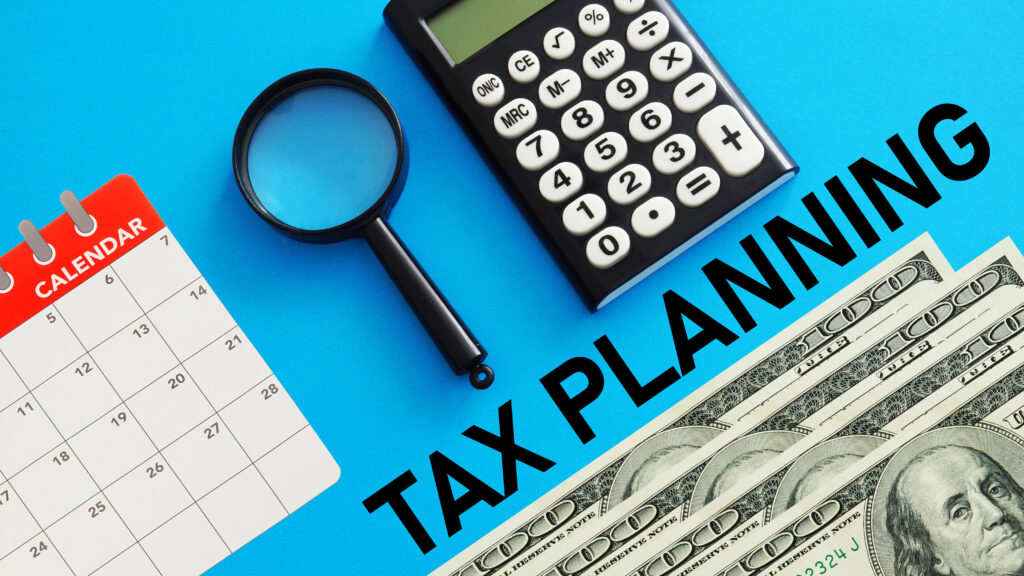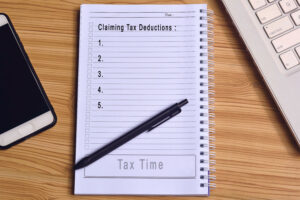It’s November, which means my phone starts ringing with clients asking about year-end tax planning. And honestly, if you haven’t looked at your tax situation yet this year, you’re not behind—most people wait until now anyway.
The reason we do this before December 31st is pretty straightforward: once the calendar flips to January, almost everything that could’ve helped your 2024 taxes is locked in. You can’t go back and change it. So let’s talk about what you can still do.
New Jersey Makes Everything More Complicated

Are You Ready For The Tax Season?
I’ll be honest with you—doing taxes in New Jersey is a pain. You’re filing two returns: federal and state. And they don’t always play nice together.
The federal government has one set of rules. New Jersey has different rules. Sometimes a deduction works for federal but not state. Sometimes it’s the opposite. You have to think about both every single time.
The property tax situation is the perfect example. We have some of the highest property taxes in the country—I’ve seen bills over $20,000 for a regular suburban house. Used to be, you could deduct all of that on your federal return. Not anymore. Now there’s a $10,000 cap on state and local tax deductions, total. Your property tax, your income tax, whatever—you get ten grand and that’s it.
Meanwhile, on your NJ return, the rules are completely different. No cap on property tax deductions if you itemize. Or you can take a credit instead if you qualify. It’s enough to make your head spin.
Retirement Contributions Are Still Your Best Bet
If you have a 401(k) at work, bumping up your contributions before year-end is probably the easiest thing you can do to lower your tax bill.
You can put in $23,000 for 2024, or $30,500 if you’re over 50. That comes right off the top of your income before any taxes hit. So if you’re paying, say, 24% federal and 6% state, you’re saving 30 cents for every dollar you contribute. The math works out fast.
Go look at your last pay stub and see where you’re at for the year. If you’re nowhere near the max and you’ve got some room in your budget, increase your contribution percentage for these last few paychecks. Even an extra thousand or two makes a difference.
IRAs work the same way, but the limits are lower—$7,000, or $8,000 if you’re over 50. The nice thing about IRAs is you have until April 15th to make contributions for last year. So you’ve got more time to figure that out.
The Property Tax Mess
Your property tax bill is probably one of your biggest expenses. Mine certainly is. But how much it actually helps you tax-wise depends on a bunch of factors.
For federal, most of us in New Jersey are already maxed out at that $10,000 cap. So, paying your January property tax bill early in December doesn’t necessarily do anything for you federally. You’re already at the limit.
But for NJ state taxes, it’s different. If you itemize, you can deduct the full amount—no cap. Or if you make under $150,000 (under $75,000 if married filing separately), you might qualify for the property tax credit instead. The credit isn’t huge—like $50 for most people—but it’s better than nothing because it’s a dollar-for-dollar reduction in what you owe, not just a deduction.
If you’re a senior or disabled, there are other programs that can help you more. The Senior Freeze program is actually pretty good if you qualify. It’s worth looking into.
Medical Expenses If You Had a Rough Year
Medical expenses only help you federally if they’re over 7.5% of your income. That’s a high bar. If you make $100,000, you need more than $7,500 in medical expenses before any of it becomes deductible.
But if you’ve had a lot of medical stuff this year—surgeries, ongoing treatment, whatever—and you’re getting close to that threshold, it might make sense to pile on more expenses before December 31st.
What counts? Pretty much everything medical. Doctor visits, prescriptions, dental work, glasses, hearing aids, and medical equipment. Even the miles you drive to appointments. If you’ve been putting off getting that crown replaced or getting new glasses, and you’re close to that 7.5% number, get it done this year.
I had a client last year who was right at the edge. She accelerated some dental work she was planning to do anyway, and it ended up making about $3,000 of expenses deductible. Saved her close to a thousand dollars in taxes. Not life-changing, but not nothing either.
Charitable Giving and Whether It Even Matters
Here’s the problem with charitable deductions these days: most people don’t itemize anymore. The standard deduction is $14,600 if you’re single, $29,200 if you’re married. Unless your itemized deductions add up to more than that, you’re just taking the standard deduction and your charitable giving doesn’t affect your taxes at all.
I know that sounds cynical, but it’s the reality. You should give to charity because you want to support the cause, not for the tax deduction.
That said, if you’re someone who gives substantial amounts to charity, there are ways to make it work. One strategy is bunching—instead of giving $5,000 every year, you give $15,000 one year and nothing the next two years. That one year might push you over the standard deduction threshold, making it worth it to itemize.
Or you can use a donor-advised fund. You dump a big chunk of money into the fund, get the deduction this year, and then recommend grants to your favorite charities over the next few years. It’s like a charitable savings account.
Just keep good records. Anything over $250 needs a receipt from the charity. The IRS is picky about this stuff.
If You Run Your Own Business
Business owners have more options, but also more complexity.
If you need to buy equipment like computers, machinery, office furniture, or whatever, buying it before December 31st lets you deduct it this year instead of next year. Section 179 lets you write off the full cost immediately rather than depreciating it over five or seven years.
The limits are generous—over a million dollars for most businesses. So if you were planning to upgrade your equipment anyway, doing it in December instead of January saves you taxes this year.
Home office deductions are tricky. The space has to be used exclusively for business. Not “mostly for business” or “usually for business”—exclusively. If you work at your kitchen table, that doesn’t count. If you have a spare bedroom that’s set up as an office and nothing else happens in there, that counts.
I’ve seen the IRS deny home office deductions over stuff like this. They’re not messing around with the “exclusive use” requirement.
New Jersey-Specific Stuff You Might Not Know About
There are some NJ tax breaks that have nothing to do with federal taxes. A lot of people miss these.
If you qualified for the federal Earned Income Tax Credit, New Jersey gives you 40% of that amount as a state credit. You have to claim it, though—it’s not automatic. Well, it’s automatic if your tax software or your preparer does it right, but I’ve seen returns where it was missed.
The Child and Dependent Care Credit in NJ is different from the federal. One thing that’s unusual: New Jersey lets you claim it even if only one spouse works, as long as you meet the income limits. Most states require both spouses to work. So if you’re paying for daycare or after-school care, check if you qualify.
Veterans get a $6,000 income exemption on their NJ return. I’ve met veterans who had no idea this existed and had been overpaying for years. If that’s you, you can amend previous years’ returns and get that money back.
The Pass-Through Business Tax Thing
This one’s complicated, but if you own an S-corp, partnership, or LLC, pay attention.
New Jersey created something called the Pass-Through Business Entity Tax to get around that federal SALT cap. Basically, your business pays NJ income tax at the business level instead of you paying it personally. Then you get a credit on your personal NJ return for what the business paid.
Why would you do this? Because the business can deduct the full amount of state taxes on its federal return—no $10,000 cap. So you end up with a federal deduction you wouldn’t have gotten otherwise.
It doesn’t work for everyone, and the math can get complicated. But if you’re a business owner hitting that SALT cap hard, it’s worth discussing with your accountant. The election has to be made before year-end, so don’t wait.
Estimated Taxes and Avoiding Penalties
If you’re self-employed or have income without withholding—rental properties, investments, whatever—you’re supposed to make quarterly estimated tax payments. The last one for 2024 is due January 15th.
Underpay your estimates and both the IRS and New Jersey will hit you with penalties and interest. It’s not a huge amount, but it’s annoying and completely avoidable.
If you had a bigger year than expected—sold some stock, got an unexpected bonus, your business did better than projected—make sure your fourth quarter payment accounts for it. You can always adjust that last payment to true things up.
Get Professional Help If You Need It
Look, I’m obviously biased here—I do this for a living. But tax law changes constantly and everyone’s situation is different. What works for your neighbor might not work for you.
If your taxes are straightforward—W-2 income, standard deduction, nothing fancy—you can probably handle this yourself with decent software. But if you’ve got multiple income sources, a business, rental properties, big investment gains, whatever—spending money on a CPA is worth it. We find things you wouldn’t know to look for.
And even if you already work with someone, schedule a meeting now. By December, we’re wrapping up year-end planning. By January, we’re buried in tax prep and don’t have time for strategy conversations.
Don’t Wait Until the Last Minute
I get calls every December 28th from people who suddenly realized they haven’t done any tax planning. At that point, your options are limited. Some things need time to set up properly.
Spend an hour or two this month looking at where you stand. Check your withholding, look at your deductions, and see what makes sense for your situation. If you’ve got questions, call your accountant now, not three days before Christmas.
The goal isn’t complicated: pay what you legally owe, but not a penny more. With New Jersey’s tax rates, even small moves can save you real money.
Take a Saturday morning, pour some coffee, and figure this out. Your future self in April will be grateful.





